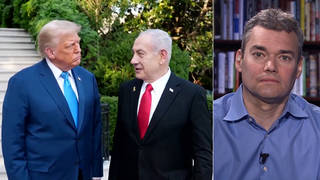
Topics
Guests
- Omar Farahstaff attorney at the Center for Constitutional Rights. He’s representing the longtime hunger-striking Guantánamo prisoner Tariq Ba Odah.
- Charles Levinsonreporter for Reuters. His co-wrote the special report, “Pentagon thwarts Obama’s effort to close Guantanamo.”
A new Reuters exposé shows the Pentagon has thwarted the Obama administration’s efforts to close Guantánamo by imposing bureaucratic hurdles to delay or derail prisoners’ release. The Pentagon has even meddled with the effort to enlist other countries in accepting freed prisoners. In one case, the Pentagon refused to release medical records for a hunger-striking Yemeni prisoner to a delegation from a country that was considering taking him in. The prisoner, Tariq Ba Odah, remains at Guantánamo today—five years after he was cleared for release. We discuss Ba Odah’s ordeal with his lawyer, Omar Farah, an attorney with the Center for Constitutional Rights; and Charles Levinson, the Reuters reporter who broke the story.
Transcript
AMY GOODMAN: But, Omar Farah, you are the attorney for Tariq Ba Odah, who remains at Guantánamo, though he was cleared five years ago. Tell us his story and why this is so significant, what Reuters has found.
OMAR FARAH: The reports from Reuters are groundbreaking reporting on Guantánamo, and the revelations about just the extent of dysfunction and insubordination in the White House around what the president says is a signature policy objective are just damning. And I think the—at the extreme, really, is the case of Mr. Ba Odah. I visited Mr. Ba Odah in March and April of this year and found him in utterly disastrous physical condition. According to the government, not me, Mr. Ba Odah is just 74-and-a-half pounds, and that’s 56 percent of his safe body weight. And we moved, at the Center for Constitutional Rights, moved on an emergency basis to have him released, because the laws of war, the Authorization for the Use of Military Force, these laws do not contemplate the indefinite detention of a cleared prisoner who is at that level of precarious physical degradation. And what it turns out now, from Reuters, is that none of this has been necessary, because there’s already a foreign country ready to accept Mr. Ba Odah and provide him medical care.
AMY GOODMAN: That the country is?
OMAR FARAH: I’m not—I’m not aware. I’m not permitted to discuss even if I were aware. The fact of the matter is what—the last step, it appears, one of the last steps in the negotiated release of this desperately ill prisoner is the simple ministerial task of forwarding his medical records to that foreign delegation. And the Department of Defense, according to Reuters’ reporting, has simply refused, despite multiple interventions from the National Security Council. And it’s no hyperbole to say that this man’s life and liberty is in the balance. And instead of emailing or simply faxing the records to a foreign delegation, the government has simply refused to do that. And this, no matter how the story of Guantánamo ends, is a black mark on the Pentagon and the White House. The Center for Constitutional Rights has long criticized the president for failing to bring the full weight and authority of his office behind this objective, and I think this is the most damning example of that level of inspiration.
JUAN GONZÁLEZ: But tell us exactly how did your client end up in Guantánamo, where was he—where was he captured, and then about the process of his being cleared for release.
OMAR FARAH: The vast majority—like the vast majority of prisoners at Guantánamo, Mr. Ba Odah was arrested in Pakistan. I think there’s a stubborn and really unfortunate myth about the men detained at Guantánamo that all of them at some point were squared off with U.S. forces and were sent to Guantánamo to neutralize the threat they’ve posed. The government’s documents themselves demonstrated that’s patently false. And Mr. Ba Odah was arrested in Pakistan, and he says, to this day, he does not understand the reasons why he was sent there. But—
JUAN GONZÁLEZ: So he was arrested by Pakistani—presumably Pakistani law enforcement, in some way.
OMAR FARAH: That’s exactly what—
JUAN GONZÁLEZ: And must have been handed over to the U.S. at some point then.
OMAR FARAH: Again, common practice, in light of the government’s really slipshod and hopelessly imprecise bounty-based system of rounding up people and sending them to Guantánamo. As you know, Mr. Ba Odah has been cleared for release. And just so your viewers understand what that means, that means by the unanimous determination of the most important national security and defense organizations—agencies within the U.S. government, they have determined that he can leave Guantánamo.
And now, the missing piece of that puzzle seems to have been resolved, which is that there is a foreign country, a third country, ready to accept him and help provide him medical care and rehabilitate him. This is a person who’s desperately, desperately ill. And the last step of that negotiated release, it seems, is the simple task of forwarding his medical records. The Department of Defense cites privacy concerns as the reason why they haven’t done that. That’s a lie. And it’s a bad lie. And I know that because I sat with Mr. Ba Odah while he provided his informed written consent to release of his medical records, to me as his counsel and also for the specific purpose of negotiating his release. And can anyone doubt whether or not this man, at 74 pounds, force-fed through the nose twice a day, in solitary confinement, would provide his consent, knowing that it could lead to his release from Guantánamo after 14 years?
AMY GOODMAN: You work at the Center for Constitutional Rights. Does CCR have any legal recourse here?
OMAR FARAH: We already have a motion that is ripe and pending before a federal judge in D.C., asking for his release on the basis of his grave medical condition. And, of course, the implication of the Reuters reporting is that, really, the administration itself is in this schizophrenic state of stating that they want to release Mr. Ba Odah—that’s something that’s in the government’s briefs filed in federal court—and at the same time working, it seems tooth and nail, to prevent that from happening. And so we’ll have to consider what to do next.
AMY GOODMAN: Finally, Charles Levinson, what is the rationale that people inside the Pentagon give? And if Hagel was forced out over this, the former secretary of defense, will the same thing happen to Ash Carter? And what about President Obama’s use of executive orders?
CHARLES LEVINSON: He reserves the right to resort to executive order to deal with closing the prison, and I think that’s largely a part—you know, that will largely come to the actual act of transferring the remaining 40, 50 prisoners in Guantánamo, who are deemed too dangerous to transfer, back to the United States.
As for Ash Carter’s future, I don’t want to predict. I think it’s going to—you know, it will largely depend on how things play out in the next weeks and months, as whether—as to whether there is substantial progress. And it is seen that the Pentagon has sort of stepped up its cooperation with the administration on this effort to close Guantánamo.
The first part of your question about the justifications inside the Pentagon, inside the military, well, I think one of the big factors is simply that if you look at the wars the U.S. has fought over the past decade and a half, particularly the war in Afghanistan, which is the one that relates to Guantánamo, it’s the military that’s paid the highest price in those wars. You know, the vast majority of U.S. casualties have been U.S. soldiers and military personnel. And I think there’s a deep reluctance to release any prisoner who may have—who the military believes or fears may have been involved in the fight against U.S. personnel, military personnel in Afghanistan, or fears perhaps could return to fight against U.S. military—you know, the U.S. military in Afghanistan.
AMY GOODMAN: I mean, interestingly, the—
CHARLES LEVINSON: You know, under the Bush administration, there were hundreds released, and there was about a third of a recidivism rate to the fight. That rate has been much lower under Obama. There’s also been a lot less released. But there are certainly—there certainly have been some high-profile cases of inmates being released from Guantánamo and then returning to the fight in Afghanistan.
AMY GOODMAN: And although, interestingly, at least one story that The New York Times featured was the story of a fighter who returned to the battlefield to fight not against the United States, but for the United States. Finally, Omar Farah, how long has Tariq Ba Odah been at Guantánamo?
OMAR FARAH: He was assigned to Guantánamo in February of 2002. He’s nearing the 14-year mark of indefinite detention, nearly nine years of that time on hunger strike and detained in solitary confinement. The president has to insist that the Department of Defense and all other agencies fall in line behind what he says is his objective and ensure that Mr. Ba Odah is released immediately.
AMY GOODMAN: Let’s end with the words of Tariq Ba Odah, talking about his time before Guantánamo, who said, quote, “We lived a wonderful family life, but all this changed since my capture. … My 11 years of time spent in solitary confinement is trying to kill the 11 years of childhood I spent in Wadi Jamilah in Saudi Arabia. Now, I live on just the imagination of my wonderful childhood. … At the moment when I am released, I would pray and kneel twice to Allah for the blessing of freedom, then go to my mother and hug her. As for my father, my chance to serve him is now gone because he passed away.”
This is Democracy Now! When we come back, we look at what could be the largest bankruptcy in U.S. history. It’s Puerto Rico. Stay with us.













Media Options